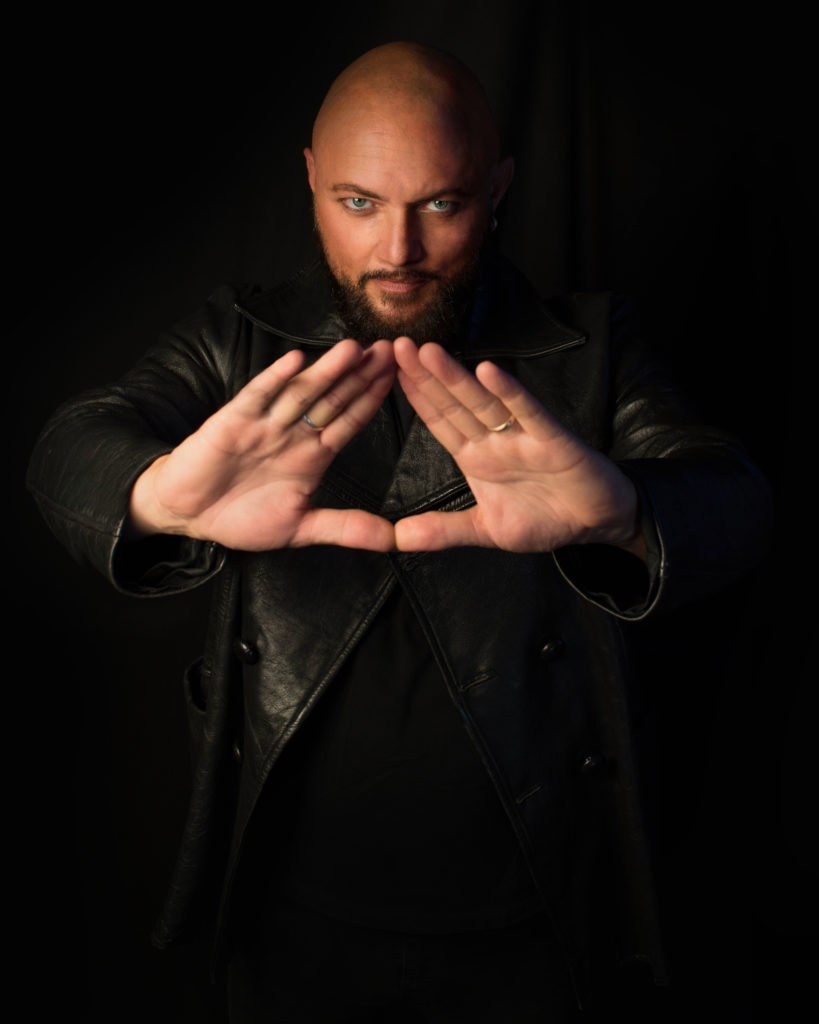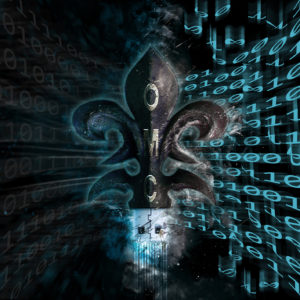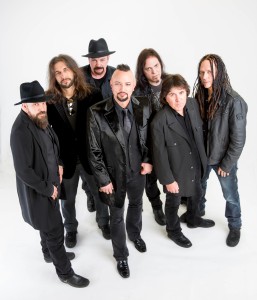
More than just a labour of love, the recently-completed musical trilogy concocted by progressive metal icon Geoff Tate is a master class of modern hard rock and metal conceptual songcraft, spread over three years and three full albums of all-new, all-original and powerfully incendiary music. The third act, The New Reality, was released on Dec. 1 worldwide through Frontiers Music in both physical and digital platforms.
The New Reality completes the somewhat dystopian, emotionally and intellectually evocative narrative arc that began under the Operation: Mindcrime banner with The Key in 2014 and continued with Resurrection in 2016. But instead of going on at length about the actual narrative and characterizations, as he has done with Music Life Magazine previously, Tate really wants listeners, even those new to the trilogy, to discover their own interpretations of the story and derive their own meaning and significance from it.
“I designed this whole story to appeal to people’s sense of mystery and discovery. And it’s kind of open ended in that it can be interpreted in a number of different ways. But there are a lot of little breadcrumb clues that are strewn about on all three records to kind of help people. Once they recognize that, it will lead them to a point, to a conclusion. And I don’t really like to give those breadcrumbs away,” he explained.
“It’s kind of a surprising ending for a lot of people once they come to it. And that point is designed to hopefully stick with people and make them think a little bit and maybe even apply that point to their own lives and how they view the world and view their world. I think there’s going to be key vocal phrases, words spoken and recurring melodic themes you will become aware of the more you listen to the three albums. That’s one of the things I kind of like about the whole project; you could be listening to it while driving in your car and a certain word will pop out and will really get you thinking and that will lead you on a bit of a journey to discover what it means at the time and in context with the whole album and the whole trilogy.”
The bulk of the tracking for the trilogy was recorded at the same time a few years back – kind of like how Lord of The Rings director Peter Jackson shot all scenes for that film trilogy at the same time. In between the releases, Tate would fine tune the mix, get the album mastered, do the cover art, liner notes and plan the marketing campaign. As with The Key and Resurrection, The New Reality features a bevy of musical heavyweights performing on the songs alongside Tate and his long-time collaborators Kelly Gray and Scott Moughton.
“All the backing tracks and the basic drum, bass and a lot of the guitars were all done at the same time. In fact, somebody told me about a recent review of the album and the reviewer knew Simon Wright (AC/DC, Dio) who was one of the drummers on the record, and he mentioned the album to Simon and Simon apparently said, ‘well I didn’t play on that. I played on the first two.’ Simon had forgotten that he played on material that was set for the third album. He didn’t realize the songs he played on would make it to the third record. And that kind of thing happens when you really busy and working on a lot of things. You play on stuff and you forget everything that you have done as time goes by,” Tate said. rhyming off some of the other contributors to the trilogy.
“Kelly and Scott played most of the guitar on it. We had Dave Ellefson from Megadeth, John Moyer from Disturbed played and co-wrote some of the songs. There was Simon of course and Brian Tichy (Whitesnake, Foreigner, Dead Daisies) played some drums, as did Mike Ferguson a friend of mine from Seattle and Scott Mercado from Candlebox.
 “I like working with different people on different parts of a song and different parts of an album. Some passages just need that something special that only certain guys can provide. It was interesting to see how different musicians interpreted the music. You would lay it out for them and say, ‘okay this is kind of what I am looking for. How can you take this to the next level or take it someplace different?’ And everybody of course has a different way of interpreting music, which I find to be fascinating to witness first hand. I would hear what they did and choose which one I thought I wanted to have for that specific part. Then it became a real process of keeping track of everybody’s recording that they did and the different sections of the song and that kind of thing. But it worked out better than I hoped. We got some really great performances on all three albums.”
“I like working with different people on different parts of a song and different parts of an album. Some passages just need that something special that only certain guys can provide. It was interesting to see how different musicians interpreted the music. You would lay it out for them and say, ‘okay this is kind of what I am looking for. How can you take this to the next level or take it someplace different?’ And everybody of course has a different way of interpreting music, which I find to be fascinating to witness first hand. I would hear what they did and choose which one I thought I wanted to have for that specific part. Then it became a real process of keeping track of everybody’s recording that they did and the different sections of the song and that kind of thing. But it worked out better than I hoped. We got some really great performances on all three albums.”
Creating three albums of material that are as musically intense as they are narratively complex was a positive but sometimes exhaustive process for Tate, who said he did absolutely nothing for a few days after the final mix for The New Reality was delivered to Frontiers Music.
“When I actually turned the record in is when it kind of hit me that it was over. That’s when it was really a big deal for me, which was a few months ago. And it was mainly because the whole project has been quite an endeavor, and actually a little more intense than I really first imagined. When I finally turned in the last record I did sigh with relief. I felt like a lot of responsibility was taken off my shoulders at that moment,” Tate said.
“And not because it was unenjoyable to make the record, it’s just that there was a lot to do. When I make a record it really consumes me; I live and breathe it. And this was three intense years of living and breathing this particular story and this music and when it was finally done I felt really good about it and very relieved. I actually kind of sat around the house for a week and didn’t do much. At that was pretty strange because I am a workaholic. My wife actually asked me if I was okay after a couple of days. She thought there was something wrong with me because I just lay around on the sofa and slept a lot.
“It was intense because of the amount of writing I did for it, just the amount of actual notes written and played and sung, and then all the lyrics on top of that. I did a lot more on this project than I had actually ever done before, so it just felt like there was a lot of I’s to dot and T’s to cross and so many details. Often times I have left a lot of stuff up to a producer or engineer. I would work in broad strokes and say, ‘okay, I need this section repeated six times here, can you make that happen?’ And I would walk away and do something else and come back and it would be done. But for this project I did a lot of that sort of stuff hands on myself.”
The name of the project is Operation: Mindcrime, which has sometimes been considered the name of the band Tate would be fronting after settling a legal dispute with his former bandmates in Queensryche over use of that name. Tate was allowed to use Operation: Mindcrime, the title of one of Queensryche’s most popular and critically-acclaimed albums, while the remaining members of Queensryche continue to use that name.
But Tate has stated a number of times in recent weeks, including to Music Life Magazine, that he will not be using that moniker again for future projects.
“It was always put together as a project to accomplish the goal of this story and this series of albums. And then what would happen after that was really up in the air. So, yeah, this will be the last album under the name Operation: Mindcrime with me. And to be honest, I don’t have a solid plan, other than this coming year of touring, which is going to be pretty intense. I plan on going to a lot of places and playing a lot of shows, so that’s my immediate plan,” he said.
 “I have a lot of material to choose from, counting Queensryche this is my 18th album so I am going to play a lot of stuff from my past and some stuff from the present and mix it up and present a big picture account of my career. In between projects I go into this mode where I just soak up stuff. I do a lot of note taking. I will record stuff on my phone – little snippets of ideas – or if I am home I will sit down at the piano for a while and jot down some ideas and record them, not with any kind of goal in mind, but ideas pass through your head so it’s nice to log them in some way.
“I have a lot of material to choose from, counting Queensryche this is my 18th album so I am going to play a lot of stuff from my past and some stuff from the present and mix it up and present a big picture account of my career. In between projects I go into this mode where I just soak up stuff. I do a lot of note taking. I will record stuff on my phone – little snippets of ideas – or if I am home I will sit down at the piano for a while and jot down some ideas and record them, not with any kind of goal in mind, but ideas pass through your head so it’s nice to log them in some way.
“That’s how I work and have always worked. I just collect ideas and then at some point I open up the book and look at all the ideas and go, ‘oh, that kind of works with what I am thinking now.’ And maybe I could put those ideas together and have something. That’s kind of where I am at now, in that mode of collecting ideas and contemplation.”
On the topic of his former band, there was a bit of a buzz in social media circles when it became known that there was a little mini-reunion of sorts between Tate and his former bandmates. It was a quick, friendly off-stage gathering that had some wags speculating that perhaps this was the first step in some sort of reunion after what was a rancorous split in 2012, and the ensuing legal battle over who controlled the rights to the name.
“Yes, I did meet up with the guys briefly, some of them, this past summer in Barcelona. I was playing with [German super-group rock opera project] Avantasia at a festival there and Queensryche was on early in the afternoon. I went out early to the venue to see them because I had never seen them play, and ended up having brief conversations with [co-founders] Eddie Jackson and Michael [guitarist Wilton] and the other guitar player Parker [Lundrgen, who joined in 2009]. I also talked to the singer Todd [La Torre] a little bit because I had never met him before. So it was quite nice to sort of break the ice since we all hadn’t spoken since 2012 when the split happened,” Tate said.
“It was kind of a treat to see them play. It was all good. But, in regards to there being a reunion of Queensryche, I would say that it would be highly unlikely, let’s put it that way. My mind is open to it, but I think at this point it is highly unlikely that it would ever happen.”
For more information on Tate, Operation: Mindcrime and The New Reality, visit http://geofftate.com, http://operationmindcrime.com/wordpress, or https://twitter.com/geofftate.
- Jim Barber is a veteran award-winning journalist and author based in Napanee, ON, who has been writing about music and musicians for a quarter of a century. Besides his journalistic endeavours, he now works as a communications and marketing specialist. Contact him at jimbarberwritingservices@gmail.com.
